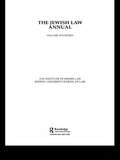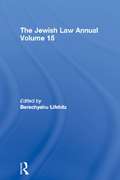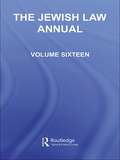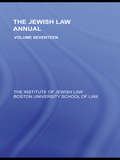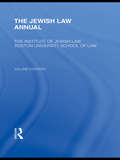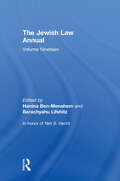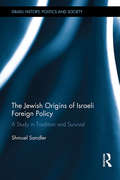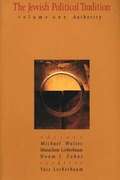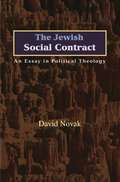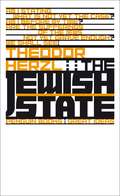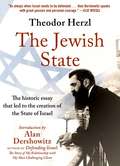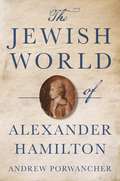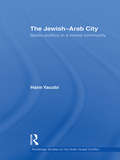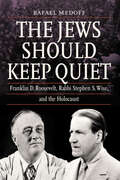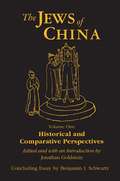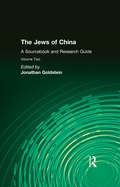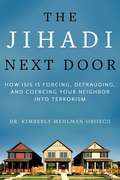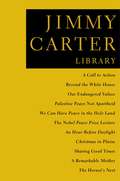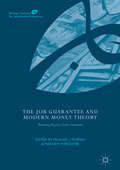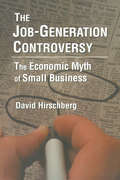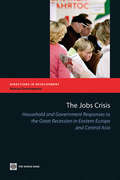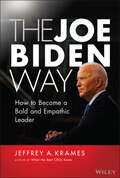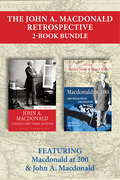- Table View
- List View
The Jewish Enemy: Nazi Propaganda during World War II and the Holocaust
by Jeffrey HerfThe sheer magnitude of the Holocaust has commanded our attention for the past sixty years. The extent of atrocities, however, has overshadowed the calculus Nazis used to justify their deeds. According to German wartime media, it was German citizens who were targeted for extinction by a vast international conspiracy. Leading the assault was an insidious, belligerent Jewish clique, so crafty and powerful that it managed to manipulate the actions of Roosevelt, Churchill, and Stalin. Hitler portrayed the Holocaust as a defensive act, a necessary move to destroy the Jews before they destroyed Germany. Joseph Goebbels, Minister of Propaganda, and Otto Dietrich’s Press Office translated this fanatical vision into a coherent cautionary narrative, which the Nazi propaganda machine disseminated into the recesses of everyday life. Calling on impressive archival research, Jeffrey Herf recreates the wall posters that Germans saw while waiting for the streetcar, the radio speeches they heard at home or on the street, the headlines that blared from newsstands. The Jewish Enemy is the first extensive study of how anti-Semitism pervaded and shaped Nazi propaganda during World War II and the Holocaust, and how it pulled together the diverse elements of a delusionary Nazi worldview. Here we find an original and haunting exposition of the ways in which Hitler legitimized war and genocide to his own people, as necessary to destroy an allegedly omnipotent Jewish foe. In an era when both anti-Semitism and conspiracy theories continue to influence world politics, Herf offers a timely reminder of their dangers along with a fresh interpretation of the paranoia underlying the ideology of the Third Reich.
The Jewish Law Annual Volume 14 (Jewish Law Annual #14)
by The Institute of Jewish Law, Boston University of LawThe volume contains ten articles, including a penetrating analysis of the application of Jewish price fraud law to the workings of the present-day marketplace. Diverse in their scope and focus, the articles address legal, historical, textual, comparative and conceptual questions.The volume concludes with a survey of recent literature on biblical and Jewish law, and a chronicle section, which discusses recent Israeli and American court cases involving issues where Jewish law is of particular relevance, thereby making the Annual a journal of record.
The Jewish Law Annual Volume 15 (Jewish Law Annual)
by Berachyahu LifshitzVolume 15 of The Jewish Law Annual adds to the growing list of articles on Jewish law that have been published in volumes 1-14 of this series, providing English-speaking readers with scholarly material meeting the highest academic standards. The volume contains six articles diverse in their scope and focus, encompassing legal, historical, textual, comparative and conceptual analysis, as well as a survey of recent literature and a chronicle of cases of interest. Among the topics covered are: lying in rabbinical court proceedings; unjust enrichment; can a witness serve as judge in the same case?; Caro's Shulham Arukh v. Maimonides' Mishne Torah in the Yemenite community, the New Jersey eruv wards.
The Jewish Law Annual Volume 16 (Jewish Law Annual #10)
by Berachyahu LifshitzVolume 16 of The Jewish Law Annual adds to the growing list of articles on Jewish Law that have been published in volumes 1-15 of this series, providing English-speaking readers with scholarly material meeting the highest academic standards. The volume contains seven articles diverse in their scope and focus, encompassing legal, historic, textual, comparitive and conceptual analysis, as well as a chronicle of cases of interest, and a survey of recent literature. Three of the articles, one of which explores references to Genesis in (western) canon law, make up a special section on the book of Genesis. The other topics covered are: suicide as an act of atonement in Jewish law; early interpretations of the Bible and Talmud as reflecting medieval legal realia; Ashkenazic codifiers in Spain; and authority, custom and innovation in the seventeenth-century Italian halakhic encyclopedia, Pahad Yitzhak.
The Jewish Law Annual Volume 17 (Jewish Law Annual)
by Berachyahu LifshitzVolume 17 of The Jewish Law Annual adds to the growing list of articles on Jewish law that have been published in volumes 1-16 of this series, providing English-speaking readers with scholarly articles presenting jurisprudential, historical, textual and comparative analysis of issues in Jewish law. The volume contains seven articles diverse in their scope and focus. Two articles are devoted to the halakhic thought of Rabbi A. I Kook; two treat classic legal questions: breach of a promise to marry, and the legal capacity of minors; two examine aspects of the judicial process, one exploring talmudic analyses of the biblical requirement that courts be established in every town, and the other, post-talmudic views on judicial authority in cases suspected of fraudulent claims. Another article addresses the fascinating question of the epistemic-pedagogic worldviews of the rival Tannaitic legal academics, the House of Hillel and the House of Shammai. The volume concludes with a section on Israeli legislation that adduces or is informed by Jewish law, and two reviews of a much-discussed recent book on a topic of considerable contemporary interest: the agunah problem.
The Jewish Law Annual Volume 18 (Jewish Law Annual #18)
by Berachyahu LifshitzVolume 18 of The Jewish Law Annual contains six comprehensive articles on various aspects of Jewish law. Three articles address family law. One addresses the painful issue of the plight of the wife whose husband withholds conjugal relations. In a marriage where relations are withheld, the wife may seek a divorce, while her husband may withhold divorce. Prolonged withholding of divorce renders the wife an agunah, that is, a wife chained to a dead marriage and unable to start anew and rebuild her life. The author explores the halakhic feasibility of allowing a wife in such a predicament to bring a claim for damages against her husband for infliction of mental distress. If such claims are allowed, recalcitrant husbands may rethink their intransigence and consent to grant the divorce. Another article examines the evolution of halakhic thinking on the parent–child relationship. It traces the stages by which halakhic family law changed from a basically patriarchal system in which both mother and the child were deemed subject to the father’s will, to a more balanced system where wife and husband have equal standing with respect to custody matters, and the best interest of the child is the main consideration in custody proceedings. In another article, halakhic attitudes to corporal punishment of children are analyzed. The author explores whether the "Spare the rod and spoil the child" adage, which is based on a verse from Proverbs, indeed reflects the position of Jewish law. He shows that in fact, while recourse to corporal punishment for educational purposes is permitted--subject to detailed qualifications that greatly limit its scope--two divergent approaches to corporal punishment can be discerned in the halakhic sources. One maintains that administration of corporal punishment can be a useful pedagogic tool of last resort, whereas the other seeks to minimize recourse to corporal punishment in the educational context, questioning its efficacy. The article shows that in any event, the notion that corporal punishment is required by the law, as some, invoking the "spare the rod" maxim, have maintained, is by no means borne out by the halakhic literature. The volume also features a fascinating article on the history of two societies founded in London to further the study of Jewish law using modern scholarly methodologies. One society was active at the end of the 1920s and beginning of the 1930s, the second was active a decade later. The article explains the background to the establishment of the societies and analyzes the societies’ objectives, leaders and memberships. Both societies were founded with the intention of reformulating the classic halakhic sources in a manner that would render them suitable for contemporary application in the nascent Jewish state. But as the author shows, ultimately much of their energy was devoted to presenting the said sources to the non-Jewish legal world, for the purpose of reciprocal enrichment and edification. Rounding out the volume are two jurisprudential studies on classic legal problems. The first explores the prohibition against seeking a second legal ruling when a ruling declaring something forbidden has been handed down. What is the scope of this rule, and in what ways does it differ from the res judicata principle in western law? The author shows that both procedural and substantive readings of the prohibition were put forward in the talmudic commentaries, and explains the jurisprudential implications of these different readings. The second article examines the question of the agent who breaches his principal’s trust, focusing on the case of the agent who executes the act he was sent to carry out, but does so for himself, rather than his principal. To what extent is he liable for ensuing damages to the principal, and is his act invariably deemed reprehensible? Another issue is the legal status of the transaction carried out by such an agent. Do the rights and obligations ge
The Jewish Law Annual Volume 19 (Jewish Law Annual #19)
by Berachyahu Lifshitz Hanina Ben-MenahemVolume 19 of The Jewish Law Annual is a festschrift in honor of Professor Neil S. Hecht. It contains thirteen articles, ten in English and three in Hebrew. Several articles are jurisprudential in nature, focusing on analysis of halakhic institutions and concepts. Elisha Ancselovits discusses the concept of the prosbul, asking whether it is correct to construe it as a legal fiction, as several scholars have asserted. He takes issue with this characterization of the prosbul, and with other scholarly readings of Tannaitic law in general. The concepts of dignity and shame are addressed in two very different articles, one by Nahum Rakover, and the other by Hanina Ben-Menahem. The former discusses halakhic sources pertaining to the dignity inherent in human existence, and the importance of nurturing it. The latter presents a fascinating survey of actual legal practices that contravened this haklakhic norm. Attestations of these practices are adduced not only from halakhic and semi-halakhic documents, but also from literary, historical, and ethnographic sources. Three articles tackle topical issues of considerable contemporary interest. Bernard S. Jackson comments on legal issues relating to the concept of conversion arising from the story of the biblical heroine Ruth, and compares that concept to the notion of conversion invoked by a recent English court decision on eligibility for admission to denominational schools. An article by Dov I. Frimer explores the much agonized-over question of halakhic remedies for the wife whose husband refuses to grant her a get (bill of divorce), precluding her remarriage. Frimer’s focus is the feasibility of inducing the husband to grant the get through monetary pressure, specifically, by awarding the chained wife compensatory tort damages. Tort remedies are also discussed in the third topical article, by Ronnie Warburg, on negligent misrepresentation by investment advisors. Two papers focus on theory of law. Shai Wozner explores the decision rules–conduct rules dichotomy in the Jewish law context, clarifying how analysis of which category a given law falls under enhances our understanding of the law’s intent. Daniel Sinclair explores the doctrine of normative transparency in the writings of Maimonides, the Hatam Sofer, and R. Abraham Isaac Kook, demonstrating that although transparency was universally endorsed as an ideal, some rabbinical authorities were willing to forego transparency where maintenance of the halakhic system itself was imperiled. An article by Alfredo M. Rabello reviews the primary and secondary literature on end-of-life issues, and contextualizes the much-discussed talmudic passage bAvoda Zara 18a. And an article by Chaim Saiman offers a critical survey of the main approaches to conceptualizing and teaching Jewish law in American universities; it also makes suggestions for new, and perhaps more illuminating pedagogic direction. In the Hebrew section, an intriguing article by Berachyahu Lifshitz presents a comparison of Persian and talmudic law on the status of promises and the role of the divine in their enforcement. Yuval Sinai discusses the halakhic law of evidence, particularly the well-known "two witnesses" requirement and departures from it. The volume closes with a historical article by Elimelech Westreich on the official rabbinical court in nineteenth century Jerusalem. It focuses on the rabbinical figures who served on the court, the communities for whom it adjudicated, and its role in the broader geopolitical and sociocultural context.
The Jewish Origins of Israeli Foreign Policy: A Study in Tradition and Survival (Israeli History, Politics and Society)
by Shmuel SandlerThe conventional understanding of Israeli foreign policy has been that it is a relatively new phenomenon, with some claiming that the ‘Jewish People’ is an invention by mid-19th century Jewish historians, or simply an ‘imagined community’. This book disputes these claims by demonstrating that the Jews have a tradition of foreign relations based on an historical political tradition that goes back thousands of years, and that this tradition has been carried over to the State of Israel. The Jewish political tradition in foreign policy has always been defensive-oriented, whether under sovereignty or in the Diaspora. Power has generally been only a means for achieving survival rather than a goal in itself, whereas Jewish national identity has always been related to historical Zion. In order to explore the question of whether it is possible to identify patterns of international behaviour in the foreign policy of the Jews, the book begins with the Bible and continues through the period of the First and Second Temples, then looks at the long generations when the Jewish people were stateless, and ultimately concludes with an examination of the sovereign Jewish state of Israel. The underlying assumption is that an understanding of these characteristics will allow us to derive a better understanding of the Jewish origins of Israel’s foreign policy, which should in turn help to eliminate many of the harshest criticisms of Israel’s foreign policy. By presenting a nuanced and intricate examination of longstanding Jewish foreign policy principles, this book will appeal to students and scholars of Jewish Studies, Israeli Studies, International Relations and anyone with an interest in the relationship between religion and foreign policy.
The Jewish Political Tradition, Volume 1: Authority
by Michael Walzer Yair Lorberbaum Menachem Lorberbaum Noam Zohar Noam J. ZoharThis book launches a landmark four-volume collaborative work exploring the political thought of the Jewish people from biblical times to the present. The texts and commentaries in Volume I address the basic question of who ought to rule the community. The contributors--eminent philosophers, lawyers, political theorists, and other scholars working in different fields of Jewish studies--discuss the authority of God, the claims of kings, priests, prophets, rabbis, lay leaders, and gentile rulers during the years of the exile, and issues of authority in the modern state of Israel.
The Jewish Social Contract: An Essay in Political Theology (New Forum Books #39)
by David NovakThe Jewish Social Contract begins by asking how a traditional Jew can participate politically and socially and in good faith in a modern democratic society, and ends by proposing a broad, inclusive notion of secularity. David Novak takes issue with the view--held by the late philosopher John Rawls and his followers--that citizens of a liberal state must, in effect, check their religion at the door when discussing politics in a public forum. Novak argues that in a "liberal democratic state, members of faith-based communities--such as tradition-minded Jews and Christians--ought to be able to adhere to the broad political framework wholly in terms of their own religious tradition and convictions, and without setting their religion aside in the public sphere. Novak shows how social contracts emerged, rooted in biblical notions of covenant, and how they developed in the rabbinic, medieval, and "modern periods. He offers suggestions as to how Jews today can best negotiate the modern social contract while calling upon non-Jewish allies to aid them in the process. The Jewish Social Contract will prove an enlightening and innovative contribution to the ongoing debate about the role of religion in liberal democracies.
The Jewish State (Penguin Great Ideas)
by Theodor Herzl'We shall live at last as free men on our own soil, and die peacefully in our own homes'Theodor Herzl's passionate advocacy of the founding of a Jewish state grew out of his conviction that Jews would never be assimilated into the populations in which they lived. Herzl concluded that the only solution for the majority of Jews would be organised emigration to a state of their own.Herzl's political and social plea was the result of centuries of restrictions, hostility and pogroms against the Jews of Europe. His revolutionary proposal for the solution to anti-Semitism was a Jewish state, where Jews could live in peace, free from persecution - and this hugely influential essay led directly to the creation of Israel.GREAT IDEAS. Throughout history, some books have changed the world. They have transformed the way we see ourselves - and each other. They have inspired debate, dissent, war and revolution. They have enlightened, outraged, provoked and comforted. They have enriched lives - and destroyed them. Now Penguin brings you the works of the great thinkers, pioneers, radicals and visionaries whose ideas shook civilization and helped make us who we are.
The Jewish State: The Historic Essay that Led to the Creation of the State of Israel
by Theodor HerzlOriginally published in 1896 as Der Judenstaat, The Jewish State has taken its place among the likes of The Communist Manifesto and Common Sense as polemic writings which have changed modern history. Theodor Herzl&’s advocacy for a separate, independent Jewish state as a remedy for centuries of hostility and persecution served as the basis for modern Zionism. And though his vision would not be realized in his lifetime, it did set the course for the creation of the Israel we know today.This edition, based on the original translation to English by Sylvie D&’Avigdor, includes a foreword by Alan Dershowitz, who is among Israel&’s most prominent and most vocal scholars defenders. The Harvard law professor, who has been calledIsrael&’s lead lawyer in the court of public opinion, discusses The Jewish State&’s place in history and its impact today.
The Jewish World of Alexander Hamilton
by Andrew PorwancherThe untold story of the founding father’s likely Jewish birth and upbringing—and its revolutionary consequences for understanding him and the nation he fought to create In The Jewish World of Alexander Hamilton, Andrew Porwancher debunks a string of myths about the origins of this founding father to arrive at a startling conclusion: Hamilton, in all likelihood, was born and raised Jewish. For more than two centuries, his youth in the Caribbean has remained shrouded in mystery. Hamilton himself wanted it that way, and most biographers have simply assumed he had a Christian boyhood. With a detective’s persistence and a historian’s rigor, Porwancher upends that assumption and revolutionizes our understanding of an American icon.This radical reassessment of Hamilton’s religious upbringing gives us a fresh perspective on both his adult years and the country he helped forge. Although he didn’t identify as a Jew in America, Hamilton cultivated a relationship with the Jewish community that made him unique among the founders. As a lawyer, he advocated for Jewish citizens in court. As a financial visionary, he invigorated sectors of the economy that gave Jews their greatest opportunities. As an alumnus of Columbia, he made his alma mater more welcoming to Jewish people. And his efforts are all the more striking given the pernicious antisemitism of the era. In a new nation torn between democratic promises and discriminatory practices, Hamilton fought for a republic in which Jew and Gentile would stand as equals.By setting Hamilton in the context of his Jewish world for the first time, this fascinating book challenges us to rethink the life and legend of America's most enigmatic founder.
The Jewish-Arab City: Spatio-politics in a mixed community (Routledge Studies on the Arab-Israeli Conflict #Vol. 5)
by Haim YacobiMixed city is a term widely used in Israel to describe areas occupied by both Jewish and Arab communities. In a critical examination of such cities, the author shows how a clear spatial and mental division exists between Arabs and Jews in Israel, and how the occurrence of such communities is both exceptional and involuntary. Looking at Jewish-Arab relations in Israel in the context of the built environment, it is argued that there are complex links between socio-political relations and the production of contested urban space. The case study of one particular Jewish-Arab "mixed city", the city of Lod, is used as the platform for wider theoretical discussion and political analysis. This city has great significance in the present global context, as more and more cities are becoming polarized, ghettoized, and fragmented in surprisingly similar ways. This book examines the visible planning apparatuses and the "hidden" mechanisms of social, political, and cultural control involved in these processes. Focusing on the spatialities of power, this book brings to the fore a critical discussion of the urban processes that shape Jewish-Arab "mixed cities" in Israel, and will be of interest to students and scholars of Urban Studies, Middle East Studies and Politics in general.
The Jews Should Keep Quiet: Franklin D. Roosevelt, Rabbi Stephen S. Wise, and the Holocaust
by Rafael MedoffBased on recently discovered documents, The Jews Should Keep Quiet reassesses the hows and whys behind the Franklin D. Roosevelt administration’s fateful policies during the Holocaust. Rafael Medoff delves into difficult truths: With FDR’s consent, the administration deliberately suppressed European immigration far below the limits set by U.S. law. His administration also refused to admit Jewish refugees to the U.S. Virgin Islands, dismissed proposals to use empty Liberty ships returning from Europe to carry refugees, and rejected pleas to drop bombs on the railways leading to Auschwitz, even while American planes were bombing targets only a few miles away—actions that would not have conflicted with the larger goal of winning the war. What motivated FDR? Medoff explores the sensitive question of the president’s private sentiments toward Jews. Unmasking strong parallels between Roosevelt’s statements regarding Jews and Asians, he connects the administration’s policies of excluding Jewish refugees and interning Japanese Americans.The Jews Should Keep Quiet further reveals how FDR’s personal relationship with Rabbi Stephen S. Wise, American Jewry’s foremost leader in the 1930s and 1940s, swayed the U.S. response to the Holocaust. Documenting how Roosevelt and others pressured Wise to stifle American Jewish criticism of FDR’s policies, Medoff chronicles how and why the American Jewish community largely fell in line with Wise. Ultimately Medoff weighs the administration’s realistic options for rescue action, which, if taken, would have saved many lives.
The Jews of China: v. 1: Historical and Comparative Perspectives
by Jonathan Goldstein Benjamin I. SchwartzThis interdisciplinary study examines patterns of migration, acculturation, assimilation and economic activity of successive waves of Jewish arrivals in China from approximately AD 1100 to 1949.
The Jews of China: v. 2: A Sourcebook and Research Guide
by Jonathan GoldsteinAn impressive interdisciplinary effort by Chinese, Japanese, Middle Eastern, and Western Sinologists and Judaic Studies specialists, these books scrutinize patterns of migration, acculturation, assimilation, and economic activity of successive waves of Jewish arrivals in China from approximately A.D.1100 to 1949.
The Jihadi Next Door: How ISIS Is Forcing, Defrauding, and Coercing Your Neighbor into Terrorism
by Kimberly Mehlman-Orozco Chris SampsonThe recruitment of ISIS terrorists may have begun as an extremist crusade in Iraq, but it has quickly become a global phenomenon that is taking hold of people from diverse backgrounds, cultures, and belief systems. The iconic image of a terrorist as an old, angry, middle-eastern man is long gone. It has since been replaced by young men and women of all races and religious upbringings, in tactical gear and ski masks, carrying heavy artillery. From the outside looking into the Islamic State, most people see these men and women as nothing more than evil terrorists with a psychotic penchant for violence. Internally, they perceive themselves as freedom fighters or mujahedeen, who violate the laws of men to protect their community according to the will of Allah. Ultimately, neither of these perceptions are based in reality. While some experts claim that terrorist recruitment is completely random, criminologist Kimberly Mehlman-Orozco has identified clear patterns which can be used to explain how regular people are being conscripted into terrorism. Using interviews with convicted terrorists, in-depth research and analysis of extremist propaganda, and case-specific details, Dr. Mehlman-Orozco provides nuanced theories into the methods of terrorist recruitment—methods which can be used to identify persons at high risk of being targeted.The Jihadi Next Door provides unprecedented information that can be used to actually combat terrorism. By laying bare the tactics used by ISIS to deceive and exploit new recruits and exposing the veneer these extremists operate under, Dr. Mehlman-Orozco hopes to empower readers with the knowledge needed to prevent future recruitment and thereby preventing acts of terrorism.
The Jimmy Carter Library
by Jimmy CarterA collection of 11 books by former U.S. President Jimmy Carter. Includes:<P> * A Call to Action<P> * Beyond the White House <P> * Our Endangered Values<P> * Palestine Peace Not Apartheid<P> * We Can Have Peace in the Holy Land <P> * The Nobel Peace Prize Lecture <P> * An Hour Before Daylight <P> * Christmas in Plains <P> * Sharing Good Times <P> * A Remarkable Mother <P> * The Hornet's Next <P>
The Job Guarantee
by Michael J. Murray Mathew ForstaterThis timely collection will be the first of its kind to focus on the practical application of the government job guarantee (JG) for both developed and developing economies. Global case studies include: United States, China, Ghana, Argentina, Ireland, Iceland, and India.
The Job Guarantee and Modern Money Theory
by Michael J. Murray Mathew ForstaterThe contributors to this edited collection argue that a flexible Job Guarantee program able to react to an economy's fluctuating need for work would stabilize the labor standard, the value of employment in relation to money. During economic downturns, the program would expand to provide more public sector jobs in response to private sector layoffs. It would then contract when economic growth offered private sector employment opportunities. This flexible full employment program would create a balanced, perpetually active labor force, providing the macroeconomic stability necessary to define a functioning labor standard. Just as the gold standard measured the worth of money against gold reserves, John Milton Keynes argued, so a labor standard ought to measure the value of money in terms of its labor equivalent. However, he failed to account for the fact that, unlike a gold standard, a labor standard does not have any kind of surety that money will continue to match its value in paid work over time. Together, the contributors argue that full employment would provide this missing security and allow authorities to define the value equivalencies of money and labor, the way that money once represented its exact equivalent in gold.
The Job-Generation Controversy: The Economic Myth of Small Business
by David HirschbergThis book exposes how the Small Business Administration (SBA) and the National Federation of Independent Business (NFIB), using erroneous data, have developed and perpetuated the belief that "small business creates all the new jobs". It shows further that, since the early 1990s, this belief has become a mantra for allowing the SBA and NBIF to lobby effectively for preferential treatment such as low-interest loans and exemption from mandated employee benefits and worker safety regulations.
The Jobs Crisis
by World Bank StaffThe financial crisis, which began in the United States and Western Europe swiftly expanded into an economic crisis throughout developing countries. The Eastern Europe and Central Asia region was hit harder than any other region in the world. Deteriorating macroeconomic conditions led to deteriorating household welfare, as unemployment increased. Those workers who kept their jobs took home smaller paychecks. Men became more highly represented among the unemployed, and youth struggled to secure their first job. Confronted by an income shock, families tried two strategies. First, families took steps to increase incomes, by inserting non-working members of the family into the labor force, by increasing the number of hours of work, borrowing, and tapping formal and informal safety nets. Second, families took steps to reduce expenditures, but some of those measures (food expenditures, health care utilization) could have an impact on nutrition and health in the long run. More positively, most households kept their children in school. Many countries took steps to protect human welfare and long-term human capital. Measures included gearing up automatic stabilizers such as unemployment insurance, scaling up active labor market programs, strengthening last-resort social assistance, or increasing minimum pensions. These measures, however, only covered a minority of those in need and some programs responded more slowly than necessary. In addition, evidence from a few countries shows steps to ensure access to health and education services, especially for the poorest in the population. The report finds that governments in the region can improve their crisis responses by making automatic stabilizers more responsive and broad based; adjusting program parameters to the conditions on the ground; and starting new programs to fill coverage gaps that emerge. However, to enable an efficient and flexible crisis response, governments can benefit from fiscal discipline during good times and reliable and timely monitoring systems.
The Joe Biden Way: How to Become a Bold and Empathic Leader
by Jeffrey A. KramesDiscover what sets leaders like President Biden apart from the rest In The Joe Biden Way: How to Become a Bold and Empathic Leader, bestselling author and leadership expert Jeffrey Krames provides readers with leadership secrets gleaned from one of the most transformative and successful presidents in modern times: Joseph Robinette Biden, Jr. In this book, the author sets out 7 lessons in inspiring leadership that have helped the 46th President of the United States carry his powerful message to the White House and deliver it to hundreds of millions of people. You’ll learn how to: Lead with empathy and demonstrate you understand what your followers are experiencing Set a single priority and focus on it with laser precision Learn to execute on your goals and back your words with meaningful action Build on and cultivate your strengths and values Lead diverse groups of people and inspire them to share a common goal Perfect for executives, managers, and other business leaders, The Joe Biden Way is a must-read resource for anyone who strives to unlock the best in their followers and colleagues and discover what sets great leaders apart from the rest of the pack.
The John A. Macdonald Retrospective 2-Book Bundle: Macdonald at 200 / John A. Macdonald
by Roger Hall Patrice Dutil Ged MartinThis special 2-book bundle contains a number of perspectives on a man who was arguably Canada’s most famous political leader, a figure of legendary proportions in the history of Canada’s birth and development. Ged Martin’s biography tells Macdonald’s story. Shocked by Canada’s 1837 rebellions, Macdonald sought to build alliances and avoid future conflicts. Thanks to financial worries and an alcohol problem, he almost quit politics in 1864. The challenge of building Confederation harnessed his skills, and in 1867 he became the country’s first prime minister. He drove the Dominion’s westward expansion, rapidly incorporating the Prairies and British Columbia before a railway contract scandal unseated him in 1873. He conquered his drinking problem and rebuilt the Conservative Party to regain power in 1878. The centrepiece of his protectionist National Policy was the transcontinental railway, but a western uprising in 1885 was followed by the controversial execution of rebel leader Louis Riel. Although dominant nationally, this popular hero had many flaws. Macdonald at 200 presents fifteen fresh interpretations of Canada’s founding prime minister, published for the occasion of the bicentennial of his birth in 1815. Crisply written by recognized scholars and specialists, the collection throws new light on Macdonald’s formative role in shaping government, promoting women’s rights, managing the nascent economy, supervising westward expansion, overseeing relations with Native peoples, and dealing with Fenian terrorism. A special section deals with how Macdonald has (or has not) been remembered by historians as well as the general public. The book concludes with an afterword by prominent Macdonald biographer Richard Gwyn. Macdonald emerges as a man of full dimensions — an historical figure that is surprisingly relevant to our own times. Includes John A. Macdonald Macdonald at 200

